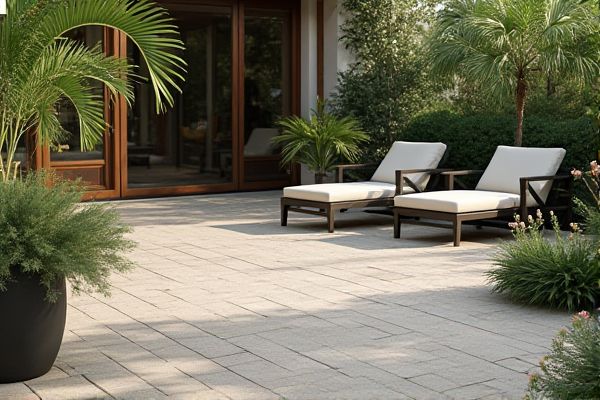
Deck tiles offer quick, modular installation with excellent drainage and slip resistance, making them ideal for elevated or wooden surfaces, while patio tiles typically provide a more durable, heavy-duty option suited for ground-level, concrete, or stone patios. Discover the key differences to choose the best option for Your outdoor space by reading the rest of the article.
Table of Comparison
| Feature | Deck Tiles | Patio Tiles |
|---|---|---|
| Material | Wood, composite, or plastic | Concrete, stone, ceramic, or porcelain |
| Installation | Snap-together, no adhesive, easy DIY | Requires mortar or adhesive, professional recommended |
| Surface | Elevated, allows drainage | Solid, flat surface |
| Durability | Moderate, weather-resistant but may wear | Highly durable, withstands heavy traffic |
| Maintenance | Requires occasional cleaning and sealing | Low maintenance, easy to clean |
| Cost | Moderate, budget-friendly | Varies, generally higher |
| Aesthetic | Natural look, warm tones | Varied designs and finishes |
| Best Use | Balconies, rooftop decks, temporary flooring | Permanent patios, walkways, driveways |
Introduction: Deck Tiles vs Patio Tiles Overview
Deck tiles are designed for easy installation on existing surfaces, often featuring interlocking systems and weather-resistant materials like composite or wood, making them ideal for elevated decks or rooftop patios. Patio tiles, typically made from natural stone, concrete, or porcelain, are thicker and more durable, suited for ground-level outdoor spaces that require long-lasting wear against heavy foot traffic and outdoor elements. Your choice depends on surface compatibility, desired aesthetics, and durability needs for outdoor living areas.
Material Comparison: Deck Tiles and Patio Tiles
Deck tiles are typically made from durable materials like wood, composite, or rubber designed to withstand outdoor conditions while providing easy installation and drainage. Patio tiles often use heavier materials such as natural stone, concrete, or porcelain, offering enhanced durability and resistance to harsh weather but requiring a more permanent installation. Your choice between deck tiles and patio tiles should consider material properties like weight, maintenance, and weather resistance to ensure longevity and aesthetic appeal.
Installation Process: Ease and Methods
Deck tiles offer a simple installation process, often designed with interlocking systems that allow for quick, tool-free placement on existing surfaces. Patio tiles may require a more involved method, including proper base preparation, leveling, and sometimes adhesive or mortar application to ensure durability. You can save time and effort with deck tiles if ease of installation is your primary concern.
Durability and Weather Resistance
Deck tiles are typically made from materials like wood composite, rubber, or plastic, offering high durability and resistance to moisture, UV rays, and temperature fluctuations, ideal for outdoor environments. Patio tiles, often crafted from porcelain, stone, or concrete, provide superior hardness and weather resistance, making them less prone to cracking or fading under intense sun exposure and freeze-thaw cycles. Selecting between deck tiles and patio tiles depends on the specific climate conditions and the desired balance between aesthetic appeal and long-term durability.
Maintenance Requirements
Deck tiles require regular cleaning to prevent mold and mildew buildup, often needing periodic sealing or oiling to maintain their appearance and durability. Patio tiles, typically made from ceramic or stone, demand less frequent maintenance but should be cleaned to remove dirt and debris, with grout lines occasionally sealed to prevent staining and water damage. Both options benefit from prompt attention to spills or damage to extend their lifespan.
Design and Aesthetic Options
Deck tiles offer a versatile range of design options, including wood, composite, and stone finishes, allowing for easy customization to fit various outdoor styles. Patio tiles provide a broader selection of patterns, textures, and colors, often featuring ceramic or porcelain materials that enhance durability and visual appeal. Both options enable homeowners to create unique, stylish outdoor spaces, but patio tiles typically allow for more intricate designs and a polished look.
Cost Analysis: Deck Tiles vs Patio Tiles
Deck tiles typically cost between $10 to $30 per square foot, offering a budget-friendly option for easy installation on existing surfaces. Patio tiles, often made from natural stone or concrete, range from $15 to $50 per square foot, reflecting their durability and weather resistance. Installation costs for patio tiles can be higher due to the need for a prepared base, while deck tiles often feature interlocking designs for quicker, lower-cost setups.
Safety and Slip Resistance
Deck tiles offer enhanced slip resistance due to their textured surfaces and water drainage capabilities, making them safer for wet environments compared to traditional patio tiles. Patio tiles, often made from smoother materials like stone or ceramic, can become slippery when wet, posing a higher risk of slips and falls. Choosing deck tiles for your outdoor space improves safety by providing better traction and reducing the likelihood of accidents.
Suitable Applications and Spaces
Deck tiles are designed for outdoor areas like rooftop decks, balconies, and wooden patios, offering quick installation and excellent drainage to withstand weather conditions. Patio tiles are best suited for ground-level paved spaces such as garden patios, walkways, and pool surrounds, providing durable, slip-resistant surfaces. Choosing the right option ensures Your outdoor living space is both functional and aesthetically pleasing, tailored to its specific environment and use.
Pros and Cons Summary
Deck tiles offer easy installation, weather resistance, and versatility, making them ideal for wooden decks or uneven surfaces, but they may require frequent cleaning and less durability under heavy furniture. Patio tiles provide a sturdy, long-lasting surface with a wide range of styles suited for outdoor spaces like concrete or stone patios, although they often involve more complex installation and higher costs. Your choice depends on the desired durability, maintenance, and installation effort for your outdoor area.
 homyna.com
homyna.com